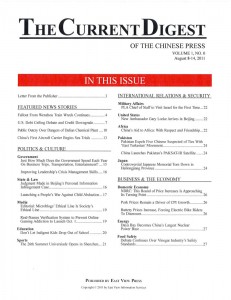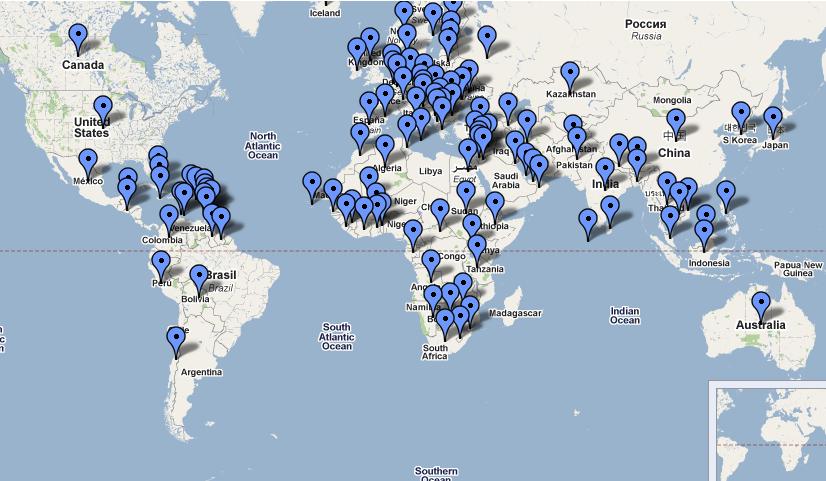Need to stay up-to-date with news and events in China? The Law Library has a new electronic subscription called Current Digest of the Chinese Press . This is an excellent resource, especially for those who do not read Chinese, because it offers an unabridged and unfiltered English translation. The product is published by East View Press, and it offers a comprehensive view of China through relevant and timely stories. The Digest is a weekly that culls articles from a broad range of sources all aimed at a domestic audience. These articles are then carefully translated so as not to lose the actual sense and meaning of the original article. So, if you need reliable Chinese news, be sure to check out the Current Digest.
. This is an excellent resource, especially for those who do not read Chinese, because it offers an unabridged and unfiltered English translation. The product is published by East View Press, and it offers a comprehensive view of China through relevant and timely stories. The Digest is a weekly that culls articles from a broad range of sources all aimed at a domestic audience. These articles are then carefully translated so as not to lose the actual sense and meaning of the original article. So, if you need reliable Chinese news, be sure to check out the Current Digest.
 The online resource Getting the Deal Through provides summaries of the laws of many countries on business-related topics (called “Practice Areas”) such as banking regulation, the environment, shipping, mergers & acquisitions, and product liability. The summaries, which are written by practicing attorneys throughout the world, are organized in a Q&A format. Getting the Deal Through has summaries for more than 40 practice areas and 100 jurisdictions, although not every jurisdiction is covered for each practice area. Material is up to date within the past year or so. Summaries for a practice area/jurisdiction (e.g. banking regulation in Argentina) can be downloaded in PDF. You can create a custom report by selecting only the countries and questions that interest you. To get to the database, do a title search in the Cornell Library catalog for “Getting the Deal Through” OR use the link on the Law Library’s Online Legal Resources page for Corporate & Securities.
The online resource Getting the Deal Through provides summaries of the laws of many countries on business-related topics (called “Practice Areas”) such as banking regulation, the environment, shipping, mergers & acquisitions, and product liability. The summaries, which are written by practicing attorneys throughout the world, are organized in a Q&A format. Getting the Deal Through has summaries for more than 40 practice areas and 100 jurisdictions, although not every jurisdiction is covered for each practice area. Material is up to date within the past year or so. Summaries for a practice area/jurisdiction (e.g. banking regulation in Argentina) can be downloaded in PDF. You can create a custom report by selecting only the countries and questions that interest you. To get to the database, do a title search in the Cornell Library catalog for “Getting the Deal Through” OR use the link on the Law Library’s Online Legal Resources page for Corporate & Securities.
![]() Cornell has joined the Roubini Global Economics University Program to provide faculty and students with access to what The Economist magazine dubbed “the world’s most important economic website.” This provides you with RGE’s rich and timely research and analysis and unique understanding of the modern global economy. RGE provides insight into macroeconomic developments along with citations and readings which act as pathways for scholars, policymakers and future business leaders who need to pursue their ideas to the next level. Features include:
Cornell has joined the Roubini Global Economics University Program to provide faculty and students with access to what The Economist magazine dubbed “the world’s most important economic website.” This provides you with RGE’s rich and timely research and analysis and unique understanding of the modern global economy. RGE provides insight into macroeconomic developments along with citations and readings which act as pathways for scholars, policymakers and future business leaders who need to pursue their ideas to the next level. Features include:
- Critical Issues: Identifies key questions essential to the research process, seeking out viewpoints beyond the consensus
- Economic Research/RGE Analysis: Deep-dive analysis into factors driving global finance developed internally by a team of 40+ economists
- EconoMonitors: Blog posts by Nouriel Roubini, RGE Analysts and an outside network of top independent contributors in global economics
- Daily Digest: Timely coverage of developments that are shaping global markets right now
- RGE Partner Content: Reports and white papers sourced from leading economic think tanks and world-recognized economic organizations.
At the Roubini website you will be invited to register for a personal account. From off campus, access Roubini using the library catalog link – http://resolver.library.cornell.edu/misc/7060771. Hat tip to Donald Schnedeker, Librarian at Cornell School of Hotel Administration, for this information.
 Want to know about corporate governance in Russia? Or copyright in Italy? Use our new database called Getting the Deal Through. The database is an online version of a series of books dealing with business issues in 43 areas of law, such as e-commerce, anti-corruption regulation, product liability and securities. Information is conveyed in a Q&A format written by practitioners in each country. You can compare information on specific topics across 100 or so jurisdictions or browse all the Q&As on a topic in your selected jurisdiction. The Q&As are written in a straightforward style which makes this comparative law resource an easy read. You can find “Getting the Deal Through” in the Corporate and Securities link in our collection of Online Legal Resources.
Want to know about corporate governance in Russia? Or copyright in Italy? Use our new database called Getting the Deal Through. The database is an online version of a series of books dealing with business issues in 43 areas of law, such as e-commerce, anti-corruption regulation, product liability and securities. Information is conveyed in a Q&A format written by practitioners in each country. You can compare information on specific topics across 100 or so jurisdictions or browse all the Q&As on a topic in your selected jurisdiction. The Q&As are written in a straightforward style which makes this comparative law resource an easy read. You can find “Getting the Deal Through” in the Corporate and Securities link in our collection of Online Legal Resources.
The National Assembly Library of the Republic of Korea hosted the joint GLIN/International Legal Information Conference from September 6-10, 2010 in Seoul, Korea. The theme of the conference was “The Future of Legal Information Service: Promoting the Global Open Access.” Some 22 countries presented reports on how they post laws and court decisions (and sometimes legal literature) online as part of the Global Legal Information Network (GLIN), the infrastructure run by the Library of Congress, but with decentralized local workstations. The process is government to government, transferring authenticated official legal information. GLIN has been particularly useful in using technology and a common platform/search engine/thesaurus to help emerging countries in Latin America and Africa make their laws available online. Korea, Argentina, Brazil, Kuwait, and others are major contributors to GLIN. The slides from my presentation at the conference on “Digitizing the World’s Laws: Evolution and Revolution” are available here. For more on the conference, click here.
At the recent International Federation of Library Associations (IFLA) meeting in Gothenburg, Sweden, access to information was reaffirmed as a basic human right. Many countries now provide online access to legal information such as statutes, codes, regulations, court decisions, and international agreements. The big question is whether the digital version of this information is official like the print version, and whether the digital version has been authenticated through a secure server or digital signature to ensure that the content has not been altered. Another issue that has emerged is the fragility and obsolescence of the digital medium and the need for preservation and long-term access, particularly for born-digital legal information which has no paper equivalent. Why does it matter? In an environment where online sources are replacing official print versions of legal information, citizens need to be able to trust the “official word of the law.” More information at http://www.ifla.org/files/hq/papers/ifla76/96-germain-en.pdf, and in French at http://ifla2010ulaval.wordpress.com/2010/08/12/seance-1-sur-les-bibliotheques-de-droit-et-les-publications-officielles-ou-gouvernementales/.
 The International Federation of Library Associations (IFLA) just released its new World Report which analyzes freedom of information and freedom of expression in 122 countries, in the form of a country-by-country fully searchable database, complete with graphical map interface. The report includes questions of:
The International Federation of Library Associations (IFLA) just released its new World Report which analyzes freedom of information and freedom of expression in 122 countries, in the form of a country-by-country fully searchable database, complete with graphical map interface. The report includes questions of:
- Internet access in libraries and freedom of access to information;
- Copyright; and
- The role of libraries in universal primary education and environmental sustainability.
The report was developed by a team at the University of Pretoria in South Africa, led by Professor Theo Bothma and contains details of the library environment in 122 countries. The analysis of the data shows that, on the one hand, there are still many countries where violations of intellectual freedom occur — such incidents were reported in 109 of the 122 countries — while on the other hand, many individual libraries have implemented innovative projects to improve access to information.



